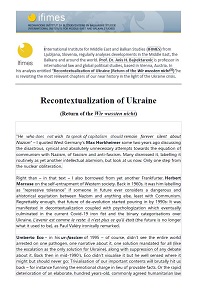Recontextualization of Ukraine (Return of the Wir wussten nicht)
Recontextualization of Ukraine (Return of the Wir wussten nicht)
Author(s): Anis H. Bajrektarević
Subject(s): Diplomatic history, Military history, Political history, Recent History (1900 till today)
Published by: IFIMES Mednarodni inštitut za bližnjevzhodne in balkanske študije
Keywords: Ukraine; Recontextualization; politics; 20th century;
Summary/Abstract: “He who does not wish to speak of capitalism should remain forever silent about Nazism” – I quoted West Germany’s Max Horkheimer some two years ago discussing the disastrous, cynical and absolutely unnecessary attempts towards the equation of communism with Nazism, of fascism and anti-fascism. Many dismissed it, labelling it routinely as yet another intellectual alarmism, but look at us now: Only one step from the nuclear obliteration. Right than – in that text – I also borrowed from yet another Frankfurter, Herbert Marcuse on the self-entrapment of Western society. Back in 1960s, it was him labelling as “repressive tolerance” if someone in future ever considers a dangerous and ahistorical equitation between Nazism and anything else, least with Communism. Regrettably enough, that future of de-evolution started pouring in by 1990s: It was manifested in decontextualization coupled with psychologization which eventually culminated in the current Covid-19 iron fist and the binary categorisations over Ukraine. L’avenir est comme le reste: il n’est plus ce qu’il était (the future is no longer what it used to be), as Paul Valéry ironically remarked.
Series: IFIMES Research Papers
- Page Count: 9
- Publication Year: 2022
- Language: English
- Content File-PDF

